|
|
|
Sort Order |
|
|
|
Items / Page
|
|
|
|
|
|
|
| Srl | Item |
| 1 |
ID:
158291


|
|
|
|
|
| Summary/Abstract |
Feminist critics of power-sharing argue that power-sharing structures privilege ethnic/ethnonational identity and impede women's descriptive and substantive political representation. This paper extends these arguments to consider the extent to which consociational theory addresses the role of civil society and women's political voice in postconflict societies. We argue that power-sharing is overly concerned with formal representation to the detriment of understanding the role civil society can play in peace building. Whilst we acknowledge the importance of civil society retaining a critical distance from political institutions, we suggest several mechanisms for incorporating civil society into power-sharing arrangements. We argue that a consideration of civil society can highlight the gendered issues that are ignored in power-sharing settings, and we conclude that a broader understanding of both “politics” and “conflict” is required for power-sharing to be more equitable to women's descriptive and substantive representation.
|
|
|
|
|
|
|
|
|
|
|
|
|
|
|
|
| 2 |
ID:
193897


|
|
|
|
|
| Summary/Abstract |
Civil wars are complex in ways that challenge effective resolution. Civil war actors tend to be dynamic in nature and often splinter then coalesce over time potentially evolving into multiple dyads pitted against their government. Previous work has demonstrated that when multiple rebel factions emerge, civil wars tend to be longer in duration as satisfying multiple factions tends to be more challenging. However, governments may choose to pursue dyadic agreements hoping to end the conflict either through subsequent dyadic negotiations or through more targeted military tactics focusing intently on the remaining faction(s). This study suggests that which dyads will be excluded from the peace is predictable, but also seeks to better understand what happens to those excluded factions that hedge their bets to continue the fight. Propositions are tested on all civil war peace agreements between 1945-2013. Key findings indicate the importance of political power-sharing provision and third-party assistance in bringing excluded groups into the fold.
|
|
|
|
|
|
|
|
|
|
|
|
|
|
|
|
| 3 |
ID:
187391
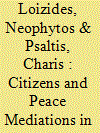

|
|
|
|
|
| Summary/Abstract |
How can areas of potential agreement be identified and endorsed by citizens in protracted conflicts? In an effort to answer this question, the article introduces a conjoint experiment across the ethnically and territorially split communities of Cyprus and tests a range of hypotheses about the structure of public opinion with respect to a future settlement. We test hypotheses on security and credible commitments, the legacy of past negotiations, as well as transitional justice mechanisms following United Nations plans to mediate the conflict between Greek and Turkish Cypriots. Contrary to conventional wisdom, we demonstrate that a zone of possible agreement (ZOPA) exists from a public opinion perspective. We specifically explore power-sharing in the context of security, provisions for the internally displaced, federal courts, and territorial readjustments and highlight their relative importance for public opinion interventions across conflict-ridden societies.
|
|
|
|
|
|
|
|
|
|
|
|
|
|
|
|
| 4 |
ID:
155419


|
|
|
|
|
| Summary/Abstract |
Since the establishment of devolution in 1999, Northern Ireland's power-sharing governments have been fragile and prone to crisis. However, following a decade of relative stability and cooperation between Nationalists and Unionists at Stormont, hopes were high that the devolved arrangements had finally become embedded and more resistant to collapse. This optimism was dashed when Sinn Féin brought down the devolved institutions in January 2017. A snap election once again returned the Democratic Unionist Party (DUP) and Sinn Féin as the largest parties and their inability to form a government resulted in yet another political stalemate. This article begins by outlining the pattern of political crises in Northern Ireland and assesses both the trigger factors and the responses. It then goes beyond the most obvious explanation for this continuing instability—that of the deep sectarian based divisions—and points to a number of other reasons for the volatility. These include issues such as the incomplete implementation of previous agreements, the impact of broader UK policies and the shadow of Direct Rule.
|
|
|
|
|
|
|
|
|
|
|
|
|
|
|
|
| 5 |
ID:
080305
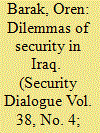

|
|
|
|
|
| Publication |
2007.
|
| Summary/Abstract |
This article suggests that much of the violence that has ravaged Iraq since the country's occupation by the US-led coalition in 2003 can be explained by focusing on the interplay between domestic and external factors that pushed Iraq's major communities (Shi'is, Sunnis, and Kurds) into conflict. The domestic factors include an intercommunal `security dilemma' that was engendered by the US-led invasion; the role of belligerent `ethnic entrepreneurs' within these communities; and the long-term animosities, apprehensions, and fears among their members. External factors include the disbandment of Iraq's ruling elite, regime, and security sector by the USA, along with the role of the Arab and Muslim volunteers who came to fight Iraq's foreign occupation. The article concludes by discussing the possible ramifications of the conflict in Iraq for domestic, regional, and international security, and mentions several steps that can help ameliorate it.
|
|
|
|
|
|
|
|
|
|
|
|
|
|
|
|
| 6 |
ID:
108498
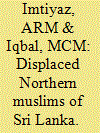

|
|
|
|
|
| Publication |
2011.
|
| Summary/Abstract |
It has been widely established as fact that ethno-political conflict and civil war between the Tamils and the Sinhalese in Sri Lanka have generated immense sufferings among the Tamil and Sinhalese ethnic groups at the level of the masses. However, very little has been discussed about the plights of the Muslims of the North and East, particularly the former who became victims of the Sri Lanka's long running ethnic conflict. In October 1990, the entire Muslim population of Jaffna, Vavumiya, Mullaitivu, Mannar and Kilinochchi districts in the northern region were evicted from their homes at gun point and turned into Internally Displaced Persons overnight by the Tamil Tigers (Liberation Tigers of Tamil Eelam). Muslims of the North claim that they have some basic and important problems to be solved. This study attempts to identify some of the special problems of the expelled Northern Muslims who are languishing in the state supported refugee camps in Puttalam district. A questionnaire on the special problems of the Northern Muslims was circulated to the North Eastern youth, students, unemployed Muslims, and farmers. The population of the target group was selected randomly. More than 250 questionnaires were issued. Ninety percent of them responded to the questionnaire. Interviews were also conducted over the phone with an educated section of the Northern Muslims. Finally, solutions are suggested to the protracted ethno-political conflict based on power-sharing and easing the special problems of the Northern Muslims.
|
|
|
|
|
|
|
|
|
|
|
|
|
|
|
|
| 7 |
ID:
080816
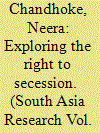

|
|
|
|
|
| Publication |
2008.
|
| Summary/Abstract |
One of the most intractable problems confronting South Asian states and societies has been the presence of secessionist movements and insistent demands for a state of one's own. Though societies and states tend to react violently when faced with such demands, many serious issues are embedded in secessionist demands, as well as in the responses to these demands, above all issues of justice and injustice. The present article seeks to trace out the key issues involved in demands for secession, exploring reasons for why and when such demands arise in the first place. Examined within the wider context of international law, specific scenarios in South Asia are considered to propel a debate about whether secession can be argued to be a right, and in what circumstances. It is proposed that the concept of secession has, in effect, to be extricated from narrow agendas of national security, war against terror, and military strategy, and placed within the wider domain of normative political theory, which can indeed find justifications for demanding secession.
|
|
|
|
|
|
|
|
|
|
|
|
|
|
|
|
| 8 |
ID:
158292


|
|
|
|
|
| Summary/Abstract |
This article applies key insights from feminist institutionalist analysis to power-sharing and political settlement in postconflict societies. Drawing on the concept of “gender orders,” allied with considerations of the informal and highly masculine rituals and rules that pervade institutional political life, the article demonstrates how apparent gendered gains in power-sharing are limited in their transformative effect. Despite a greater emphasis on female inclusion, as mandated by United Nations Security Council Resolution 1325, women's capacity to shape postconflict politics in power-sharing is limited. These limitations are shaped not only by the complexity of postconflict political landscapes but by women's restricted access to closed informal spaces pivotal to the masculine functioning of power-sharing. The tendency to view women's contributions in highly essentialized and feminized ways undercuts and devalorizes women's political work in power-sharing institutions. Urging greater attention to the informal life of political institutions, the article exposes the multiple layers of exclusion for women in postconflict political engagement.
|
|
|
|
|
|
|
|
|
|
|
|
|
|
|
|
| 9 |
ID:
158285


|
|
|
|
|
| Summary/Abstract |
Is ethnic power-sharing gender-blind? If so, what are the consequences? And, what, if anything, can be done about it? This line of inquiry informed a 2-day workshop at Queen's University Belfast (QUB) in November 2015, which explored the intersections of ethnonationalism and gender in comprehensive peace processes, with a specific focus on the extent to which power-sharing theory and practice can address new challenges emanating from the Women, Peace and Security (WPS) agenda, as embodied in United Nations Security Council Resolution 1325 (UNSCR 1325) and other subsequent resolutions.
|
|
|
|
|
|
|
|
|
|
|
|
|
|
|
|
| 10 |
ID:
143323
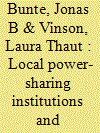

|
|
|
|
|
| Summary/Abstract |
News reports of clashes between Muslims and Christians in countries such as Nigeria are increasingly common. Yet, interreligious violence erupts only in some communities but not others. Under what conditions does religious identity become the fault line of communal violence? We argue that informal power-sharing institutions on the communal level are essential in shaping the incentives of potential perpetrators. We provide both qualitative and quantitative evidence for our claim that districts in which informal power-sharing agreements exist are less likely to experience interreligious violence. We conducted interviews with community leaders in 38 Nigerian districts to trace the process by which local power-sharing institutions exert influence on actors’ incentives to engage in religious violence. We complement this with quantitative analyses of a new dataset capturing interreligious violence on a subnational level. The analyses show that the overall degree of interreligious violence is significantly lower in districts with power-sharing than in those without. We also identify two causal mechanisms through which informal power-sharing institutions operate. First, these institutions affect the incentives of elites to appeal for cooperation. We show that the rhetoric of elites in districts with power-sharing is significantly more conciliatory. Second, power-sharing affects the general population’s perception of the interreligious tensions. Individuals living in districts with power-sharing institutions are less likely to experience religious diversity as threatening. Local-level informal power-sharing institutions are therefore an important foundation for communal peace and interreligious cooperation.
|
|
|
|
|
|
|
|
|
|
|
|
|
|
|
|
| 11 |
ID:
129455


|
|
|
|
|
| Publication |
2014.
|
| Summary/Abstract |
There has been a long-entrenched view that China's Qing Dynasty was a 'Manchu Dynasty', which imposed alien conquest on China's majority of the ethnic Han. Such a view has made the Manchus allegedly responsible for all the social evils from the 1840 Opium War onwards on the one hand and all the 'anti-Manchu' sentimentalities and movements, such as the Taipings and Republicans, automatically legitimate and revolutionary on the other. This article challenges this stereotype and argues with historical evidence that the 'Manchu rule' was a myth. Social conflicts in late Qing were mainly between the Han Chinese themselves. It is time to end the 'Manchu rule' as an easy pretext to conceal the true social issues and problems in the nineteenth- and twentieth-century China.
|
|
|
|
|
|
|
|
|
|
|
|
|
|
|
|
| 12 |
ID:
158536
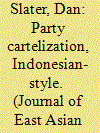

|
|
|
|
|
| Summary/Abstract |
Democracy and opposition are supposed to go hand in hand. Opposition did not emerge as automatically as expected after Indonesia democratized, however, because presidents shared power much more widely than expected. The result has been what I call party cartelization, Indonesian-style. This differs significantly from canonical cases of party cartelization in Europe. Yet it exhibits the same troubling outcome for democratic accountability: the stunted development of a clearly identifiable party opposition. Since the advent of direct presidential elections in 2004, Indonesian democratic competition has unsurprisingly assumed somewhat more of a government vs. opposition cast. But this shift has arisen more from contingent failures of elite bargaining than from any decisive change in the power-sharing game. So long as Indonesia's presidents consider it strategically advantageous to share power with any party that declares its support, opposition will remain difficult to identify and vulnerable to being extinguished entirely in the world's largest emerging democracy.
|
|
|
|
|
|
|
|
|
|
|
|
|
|
|
|
| 13 |
ID:
158924
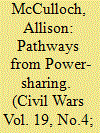

|
|
|
|
|
| Summary/Abstract |
This article focuses on power-sharing’s ‘exit dilemma’. While power-sharing may be a necessary transitional device to manage deep divisions, it also allegedly obstructs the long-term goals of peacebuilding and democratisation in divided societies. Three countervailing perspectives are considered here: (1) power-sharing is a transitional device unable to transition to more ‘normal’ political arrangements, creating instability; (2) power-sharing is a transitional device that can be designed for stability and adaptability; and (3) power-sharing is a lasting institutional fixture that facilitates peace and democratisation. The article presents a typology of pathways from power-sharing, arguing that the exit dilemma is real but not insurmountable.
|
|
|
|
|
|
|
|
|
|
|
|
|
|
|
|
| 14 |
ID:
175190


|
|
|
|
|
| Summary/Abstract |
Does power-sharing promote peace? Relying on credible commitment theory, past research has predominantly focused on one aspect of this question – namely, whether power-sharing prevents the recurrence of battle violence between agreement signatories. However, this disregards a phenomenon that plagues postwar countries across the globe: battle violence perpetrated by armed groups outside of the negotiated settlement against the postwar order. To explain this violence, I argue that we have to focus on how power-sharing redistributes power and access to resources across elites in a postwar country. By determining who gets what, when, and how, power-sharing determines the state’s counterinsurgency capabilities and thus shapes incentives and constrains for extra-agreement battle violence. Personalized power-sharing, for instance, gives elites privileged access to state resources, facilitates effective counterinsurgency strategies, and thus decreases extra-agreement violence. In contrast, structural power-sharing limits elites’ access to resources and their ability to prevent armed challenges resulting in higher levels of violence. To empirically test these propositions, I combine data from the Power-Sharing Event Dataset (PSED) with the UCDP Georeferenced Event Dataset (GED) for peace agreements in Africa and Asia signed between 1989 and 2006. I analyze these data using count models, matching procedures, and correlated random effects models. The empirical results support my expectation that personalized power-sharing is associated with fewer extra-agreement battle-deaths while structural arrangements facilitate postwar rebellions. This study contributes to an improved understanding of power-sharing as a conflict resolution tool and highlights its divergent effects on actors inside and outside of peace agreements.
|
|
|
|
|
|
|
|
|
|
|
|
|
|
|
|
| 15 |
ID:
142277


|
|
|
|
|
| Summary/Abstract |
This article uses the lenses of citizenship to examine the uneven distribution of voting rights in Bosnia and Herzegovina (BiH). While recognizing the significance of power-sharing in BiH, the article argues that the key obstacle to modifying the politics of inclusion and exclusion through citizenship and the franchise is the static nature of political competition in the country. The intimate relationship between political parties and their ethno-centric agendas on the one hand, and the multi-tiered governance structure on the other, prevents the possibility of reaching an agreement on constitutional reform as it would disrupt the current power balances that favour ethnic elites.
|
|
|
|
|
|
|
|
|
|
|
|
|
|
|
|
| 16 |
ID:
165173


|
|
|
| 17 |
ID:
165174


|
|
|
|
|
| Summary/Abstract |
The article looks at the legacy of consociationalism in Lebanon with the aim of illuminating some insights on the linkages between power-sharing and conflict resolution in the post-2011 Middle East. It highlights three core dilemmas or governance traps that have recurred in Lebanon’s political dynamic: the power-sharing formula’s proneness to deadlock, its dependence on the external environment as an avenue for partisanship and sectarian leverage, and its weak responsiveness to demands from below. The article shows how these dilemmas are tightly linked to the politics of sectarianism. While Lebanon’s postwar transition (1990 onward) serves as a backdrop for exploring these dilemmas, emphasis is placed on the performance of Lebanon’s political system in the post–Arab Spring era. The aim is to assess whether Lebanon’s consociational performance has matured over time. The Lebanese experience brings into sharper focus the limitations of sectarian power-sharing. Still, it provides useful insights for reshaping the debate on power-sharing in divided societies of the Arab world.
|
|
|
|
|
|
|
|
|
|
|
|
|
|
|
|
| 18 |
ID:
145027


|
|
|
|
|
| Summary/Abstract |
Why did the Ukraine’s 2004 Orange Revolution initiate a peaceful democratic transition, while the 2014 protests were followed by violent conflict? This article complements previous studies on Russia’s role in Ukraine by focusing on domestic explanations of the recent violence. It shows that structural factors were already conducive to violence in 2004, making it fruitful to analyse the role of agency to explain the 2014 conflict. It demonstrates that while the 2004 transition introduced power-sharing guarantees that mitigated commitment problems for the relevant parties, the 2014 transition saw no such guarantees, making violence a rational strategy for the pro-Russian separatists.
|
|
|
|
|
|
|
|
|
|
|
|
|
|
|
|
| 19 |
ID:
180196
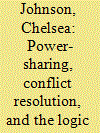

|
|
|
|
|
| Summary/Abstract |
Conclusions about the potential for peace via power-sharing are mixed. For some, power-sharing does little to overcome the commitment problem characterizing a transition from conflict, while others argue that such concessions provide signals of parties’ willingness to incur costs. This article develops and tests a new theory, aiming to shed light on the mechanisms through which power-sharing bargains help to overcome the commitment problem. I argue that government parties tend to hold an electoral and military advantage, which heightens incentives for rebel leaders to defect from a settlement prior to conceding their capacity to use violence. Where settlements provide discrete guarantees that offset the risks of electoral defeat and the co-optation of forces, these incentives for pre-emptive defection should be mitigated. I offer a novel disaggregation of provisional power-sharing subtypes, distinguishing between long-term and short-term arrangements. The analysis rests on an original, cross-national dataset of government-and-rebel dyads to negotiated settlements signed between 1975 and 2015 (N = 168). The logistic regression results clearly indicate that power-sharing settlements stipulating ‘consociational’-style reforms are significantly more likely to resolve conflict between settlement dyads, all else equal. Meanwhile, standard conceptualizations of power-sharing, which include transitional coalitions and troop integration, appear unlikely to secure rebel commitment beyond the transition period, which helps to explain the contradictory findings in existing research.
|
|
|
|
|
|
|
|
|
|
|
|
|
|
|
|
| 20 |
ID:
158286
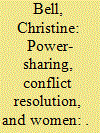

|
|
|
|
|
| Summary/Abstract |
Peace processes in intrastate conflict have, since 1990, overwhelmingly institutionalized compromises between contenders for power in the form of power-sharing arrangements. This article focuses on political power-sharing, drawing qualitatively on a global data-set of peace agreements (PA-X, Peace Agreement Database). It argues that peace agreements indicate three main functions for political power-sharing: permanent group accommodation, equitable representation of minorities in autonomy regimes, and transition management. Each of these power-sharing types raises different opportunities and challenges for women's inclusion and equality. The analysis aims to inform women's engagement with power-sharing design and implementation in fragile and conflict-affected states. It also introduces the importance of function into the power-sharing literature, which is mostly concerned with form, while illustrating the value of global data on peace agreements to “midlevel analysis” capable of bridging between broad quantitative generalizations and detailed case study analysis.
|
|
|
|
|
|
|
|
|
|
|
|
|
|
|
|
|
|
|
|
|